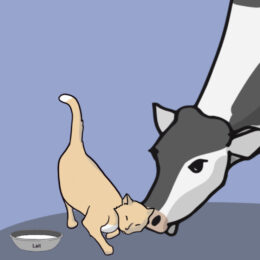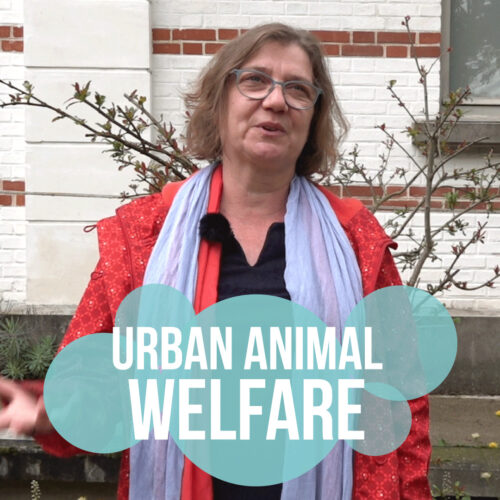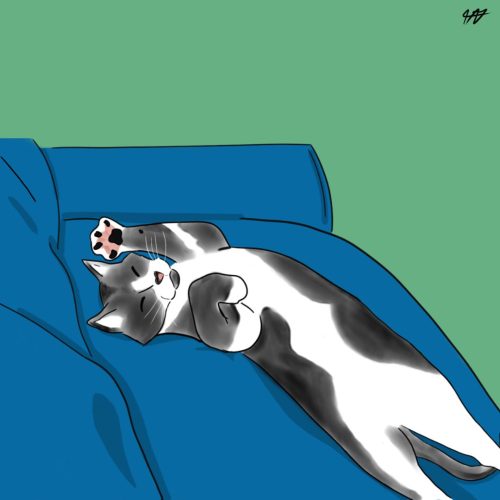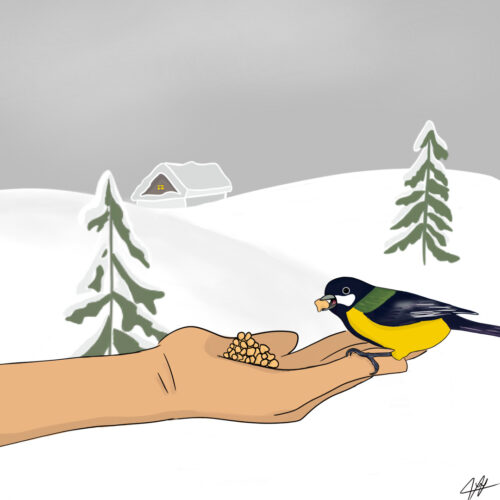

TRUE
Adult cats that tolerate it can drink it, preferably diluted in water!
Keep in mind
- Lactase is the enzyme used to digest lactose
- Kittens' lactase activity decreases between 4 and 7 weeks but the cat is then able to digest a small amount of milk
- Cats love dairy products: giving milk-flavoured water may be interesting to encourage cats to drink while not increasing their daily caloric intake too much
Answer from Charlotte Devaux, veterinary nutritionist:
For reasons totally unknown to science to date, cats love dairy products: milk, yogurt, butter… This fact about cats is very well known, to the point that many people regularly give milk to their cats or to stray cats.
But can and should a cat be given milk?
The sugar present in all animal milk is lactose. All mammal babies produce an enzyme called lactase, which allows them to digest this sugar. In kittens, lactase activity decreases after 4 to 7 weeks[1]. One may therefore think that the adult cat cannot digest lactose at all and that undigested sugar in the large intestine may cause diarrhea.
However, an early 1990s study showed that most adult cats are still able to digest 1.3g of lactose per kilo body weight)[2]. The average lactose content of milk is 4.62g/100g, so even a small cat of 3.5 kg should be able to drink 100ml of milk per day without any problems. Adult cat milk sold in the shops is only lactose-free milk sold at a high price and is not essential for most cats, who can drink a small amount of regular milk.

Are there really 50% of lactose intolerant cats?
All cats are lactose intolerant, it’s just a matter of quantity! In the study mentioned above, cats tolerated 1.3g of lactose per kilo but not 4.5g/kg. It is the state of the stools that informs us about their tolerance. If your cat has diarrhea when drinking milk, it means that it does not tolerate it.
If my cat is lactose tolerant, is it worth giving it milk?
Cats are originally from the Middle East, where they have adapted to hot, dry conditions. If they eat wet food, such as prey, they hardly need drinking at all. When given dry food, they tend to not drink enough to ensure proper hydration. So for most cats, the challenge is to get them to drink enough.
If your cat likes milk, you can use it to “flavor” its water and encourage him to drink more so that it is properly hydrated!
Why not give it pure milk?
Today, 30% of cats are overweight or obese. Giving them milk containing 47kcal/100g increases their caloric consumption and favors overweight. That’s why it’s better to dilute it in water: it allows the cat to have the taste of milk, without the calories!
What about unweaned kittens?
Unweaned kittens need milk that resembles that of their species. Cow’s milk is not at all rich enough in calories, protein, fat, copper and iron for a kitten. It should therefore be avoided in favor of cat formula.
| For 100ml | Cow | Goat | Cat |
|
Energy value (kcal) |
75 | 56 | 120 |
| Protein (g) | 3,5 | 3,4 | 8,1 |
| Fat (g) | 4 | 2,8 | 6,1 |
| Lactose (g) | 5 | 4,4 | 3,1 |
| Calcium (g) | 0,12 | 0,13 | 0,14 |
| Phosphorus (g) | 0,09 | 0,1 | 0,14 |
Nutritional value of milk from different animals

In short!
Most weaned cats are lactose tolerant enough to drink milk and do not require specific "cat milk”. You can use milk to flavor your cat's water and encourage hydration, but avoid giving it straight to prevent overweight.
[1] J. G. Morris, Jeanette Trudell, and Terri Pencovic, ‘Carbohydrate Digestion by the Domestic Cat (Felis Catus)’, British Journal of Nutrition, 37.3 (1977), 365–73 <https://doi.org/10.1079/BJN19770040>.
[2] Ellen Kienzle, ‘Carbohydrate Metabolism of the Cat. 3. Digestion of Sugars1’, Journal of Animal Physiology and Animal Nutrition, 69.1–5 (1993), 203–10 <https://doi.org/10.1111/j.1439-0396.1993.tb00806.x>
KEEP IN MIND
- Lactase is the enzyme used to digest lactose
- Kittens' lactase activity decreases between 4 and 7 weeks but the cat is then able to digest a small amount of milk
- Cats love dairy products: giving milk-flavoured water may be interesting to encourage cats to drink while not increasing their daily caloric intake too much
KEY FIGURE
This is the amount of lactose per kg of cat that an adult cat can digest



